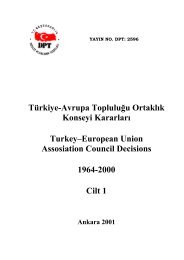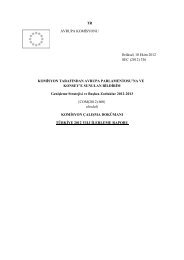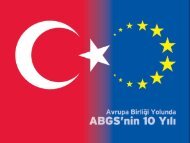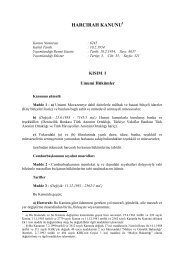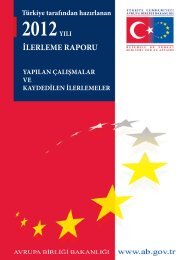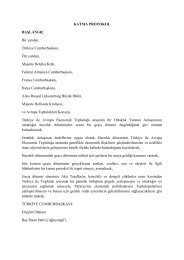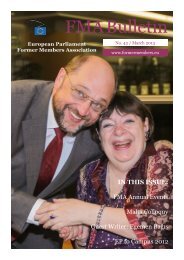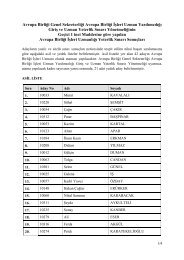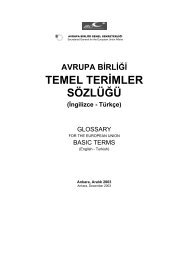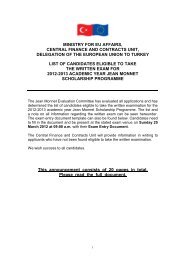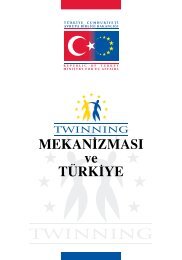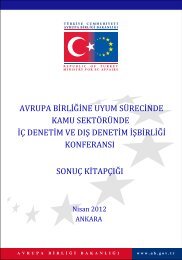2010 ilerleme raporu - Avrupa BirliÄi BakanlıÄı
2010 ilerleme raporu - Avrupa BirliÄi BakanlıÄı
2010 ilerleme raporu - Avrupa BirliÄi BakanlıÄı
You also want an ePaper? Increase the reach of your titles
YUMPU automatically turns print PDFs into web optimized ePapers that Google loves.
4. PROGRESS IN THE ENLARGEMENT COUNTRIES AND AGENDA FOR <strong>2010</strong>-<br />
2011<br />
……….<br />
4.2. Furthering accession negotiations with Turkey<br />
Turkey has continued its political reform process. Turkey amended its constitution<br />
introducing key reforms to its political and legal system which address a number of priorities<br />
in the areas of judiciary and fundamental rights. The reforms limit the competence of military<br />
courts; restructure the constitutional court; widen the composition of the high council of<br />
judges and public prosecutors, making it more representative of the judiciary as a whole;<br />
broaden trade union rights in the public sector; provide the basis for the adoption of special<br />
measures protecting the rights of women and children; guarantee protection of personal data;<br />
and grant the right to apply to an ombudsman, thus providing the legal basis for the<br />
establishment of the ombudsman institution.<br />
The constitutional amendments are an important step in the right direction. However, broad<br />
public consultation involving all political parties and civil society, with their full engagement,<br />
is needed to strengthen support for constitutional reform. It is now essential to ensure proper<br />
implementation of these reforms through relevant legislation. A new civilian constitution<br />
would provide a solid base for a further strengthening of democracy in Turkey, in line with<br />
European standards and the EU accession criteria.<br />
Regarding fundamental rights, freedom of expression and of the media needs to be<br />
strengthened in Turkey both in law and in practice. A number of shortcomings remain in the<br />
exercise of the freedom of religion. Progress is also needed regarding, women's rights and<br />
gender equality and ensuring full trade union rights. The 'democratic opening' aimed notably<br />
at addressing the Kurdish issue has produced only limited results. The security situation in the<br />
South-East has worsened, with a resurgence of attacks by the terrorist organisation<br />
PKK/Kongra-Gel. Some progress has been made in the fight against corruption.<br />
Accession negotiations advanced, albeit rather slowly. They have reached a demanding stage<br />
requiring Turkey to step up its efforts in meeting established conditions. By advancing in the<br />
fulfilment of benchmarks and of the requirements specified in the Negotiating Framework,<br />
Turkey will be able to accelerate the pace of negotiations. During the next months, Turkey<br />
should give particular priority to the competition policy, public procurement and social policy<br />
and employment chapters.<br />
Turkey's foreign policy has become more active in its wider neighbourhood. This is an asset<br />
for the European Union, provided it is developed as a complement to Turkey's accession<br />
process and in coordination with the EU. Turkey has made a number of proposals for closer<br />
EU-Turkey foreign policy cooperation. Considerable progress has been made in the<br />
negotiations towards a readmission agreement with Turkey.<br />
Turkey has continued to express public support for the negotiations under UN auspices<br />
between the leaders of the Greek Cypriot and Turkish Cypriot communities to reach a<br />
comprehensive settlement of the Cyprus problem. However, there has been no progress<br />
towards normalisation of bilateral relations with the Republic of Cyprus. Turkey has not fully<br />
EN<br />
5<br />
EN




